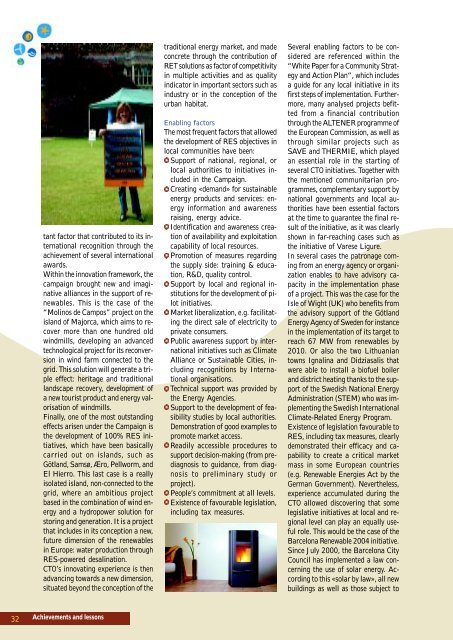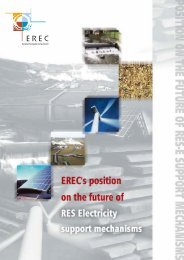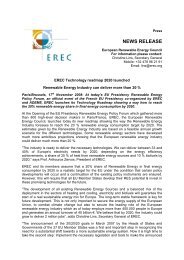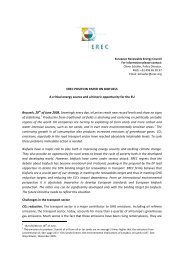CTO Assessment - European Commission
CTO Assessment - European Commission
CTO Assessment - European Commission
You also want an ePaper? Increase the reach of your titles
YUMPU automatically turns print PDFs into web optimized ePapers that Google loves.
tant factor that contributed to its international<br />
recognition through the<br />
achievement of several international<br />
awards.<br />
Within the innovation framework, the<br />
campaign brought new and imaginative<br />
alliances in the support of renewables.<br />
This is the case of the<br />
“Molinos de Campos” project on the<br />
island of Majorca, which aims to recover<br />
more than one hundred old<br />
windmills, developing an advanced<br />
technological project for its reconversion<br />
in wind farm connected to the<br />
grid. This solution will generate a triple<br />
effect: heritage and traditional<br />
landscape recovery, development of<br />
a new tourist product and energy valorisation<br />
of windmills.<br />
Finally, one of the most outstanding<br />
effects arisen under the Campaign is<br />
the development of 100% RES initiatives,<br />
which have been basically<br />
carried out on islands, such as<br />
Götland, Samsø, Æro, Pellworm, and<br />
El Hierro. This last case is a really<br />
isolated island, non-connected to the<br />
grid, where an ambitious project<br />
based in the combination of wind energy<br />
and a hydropower solution for<br />
storing and generation. It is a project<br />
that includes in its conception a new,<br />
future dimension of the renewables<br />
in Europe: water production through<br />
RES-powered desalination.<br />
<strong>CTO</strong>’s innovating experience is then<br />
advancing towards a new dimension,<br />
situated beyond the conception of the<br />
traditional energy market, and made<br />
concrete through the contribution of<br />
RET solutions as factor of competitivity<br />
in multiple activities and as quality<br />
indicator in important sectors such as<br />
industry or in the conception of the<br />
urban habitat.<br />
Enabling factors<br />
The most frequent factors that allowed<br />
the development of RES objectives in<br />
local communities have been:<br />
Support of national, regional, or<br />
local authorities to initiatives included<br />
in the Campaign.<br />
Creating «demand» for sustainable<br />
energy products and services: energy<br />
information and awareness<br />
raising, energy advice.<br />
Identification and awareness creation<br />
of availability and exploitation<br />
capability of local resources.<br />
Promotion of measures regarding<br />
the supply side: training & education,<br />
R&D, quality control.<br />
Support by local and regional institutions<br />
for the development of pilot<br />
initiatives.<br />
Market liberalization, e.g. facilitating<br />
the direct sale of electricity to<br />
private consumers.<br />
Public awareness support by international<br />
initiatives such as Climate<br />
Alliance or Sustainable Cities, including<br />
recognitions by International<br />
organisations.<br />
Technical support was provided by<br />
the Energy Agencies.<br />
Support to the development of feasibility<br />
studies by local authorities.<br />
Demonstration of good examples to<br />
promote market access.<br />
Readily accessible procedures to<br />
support decision-making (from prediagnosis<br />
to guidance, from diagnosis<br />
to preliminary study or<br />
project).<br />
People’s commitment at all levels.<br />
Existence of favourable legislation,<br />
including tax measures.<br />
Several enabling factors to be considered<br />
are referenced within the<br />
“White Paper for a Community Strategy<br />
and Action Plan“, which includes<br />
a guide for any local initiative in its<br />
first steps of implementation. Furthermore,<br />
many analysed projects befitted<br />
from a financial contribution<br />
through the ALTENER programme of<br />
the <strong>European</strong> <strong>Commission</strong>, as well as<br />
through similar projects such as<br />
SAVE and THERMIE, which played<br />
an essential role in the starting of<br />
several <strong>CTO</strong> initiatives. Together with<br />
the mentioned communitarian programmes,<br />
complementary support by<br />
national governments and local authorities<br />
have been essential factors<br />
at the time to guarantee the final result<br />
of the initiative, as it was clearly<br />
shown in far-reaching cases such as<br />
the initiative of Varese Ligure.<br />
In several cases the patronage coming<br />
from an energy agency or organization<br />
enables to have advisory capacity<br />
in the implementation phase<br />
of a project. This was the case for the<br />
Isle of Wight (UK) who benefits from<br />
the advisory support of the Götland<br />
Energy Agency of Sweden for instance<br />
in the implementation of its target to<br />
reach 67 MW from renewables by<br />
2010. Or also the two Lithuanian<br />
towns Ignalina and Didziasalis that<br />
were able to install a biofuel boiler<br />
and district heating thanks to the support<br />
of the Swedish National Energy<br />
Administration (STEM) who was implementing<br />
the Swedish International<br />
Climate-Related Energy Program.<br />
Existence of legislation favourable to<br />
RES, including tax measures, clearly<br />
demonstrated their efficacy and capability<br />
to create a critical market<br />
mass in some <strong>European</strong> countries<br />
(e.g. Renewable Energies Act by the<br />
German Government). Nevertheless,<br />
experience accumulated during the<br />
<strong>CTO</strong> allowed discovering that some<br />
legislative initiatives at local and regional<br />
level can play an equally useful<br />
role. This would be the case of the<br />
Barcelona Renewable 2004 initiative.<br />
Since July 2000, the Barcelona City<br />
Council has implemented a law concerning<br />
the use of solar energy. According<br />
to this «solar by law», all new<br />
buildings as well as those subject to<br />
32<br />
Achievements and lessons








![Energy [R]evolution - Greenpeace](https://img.yumpu.com/47174859/1/184x260/energy-revolution-greenpeace.jpg?quality=85)








